Thomas James Richards, Diaries, Transcript Vol. 2 - Part 26
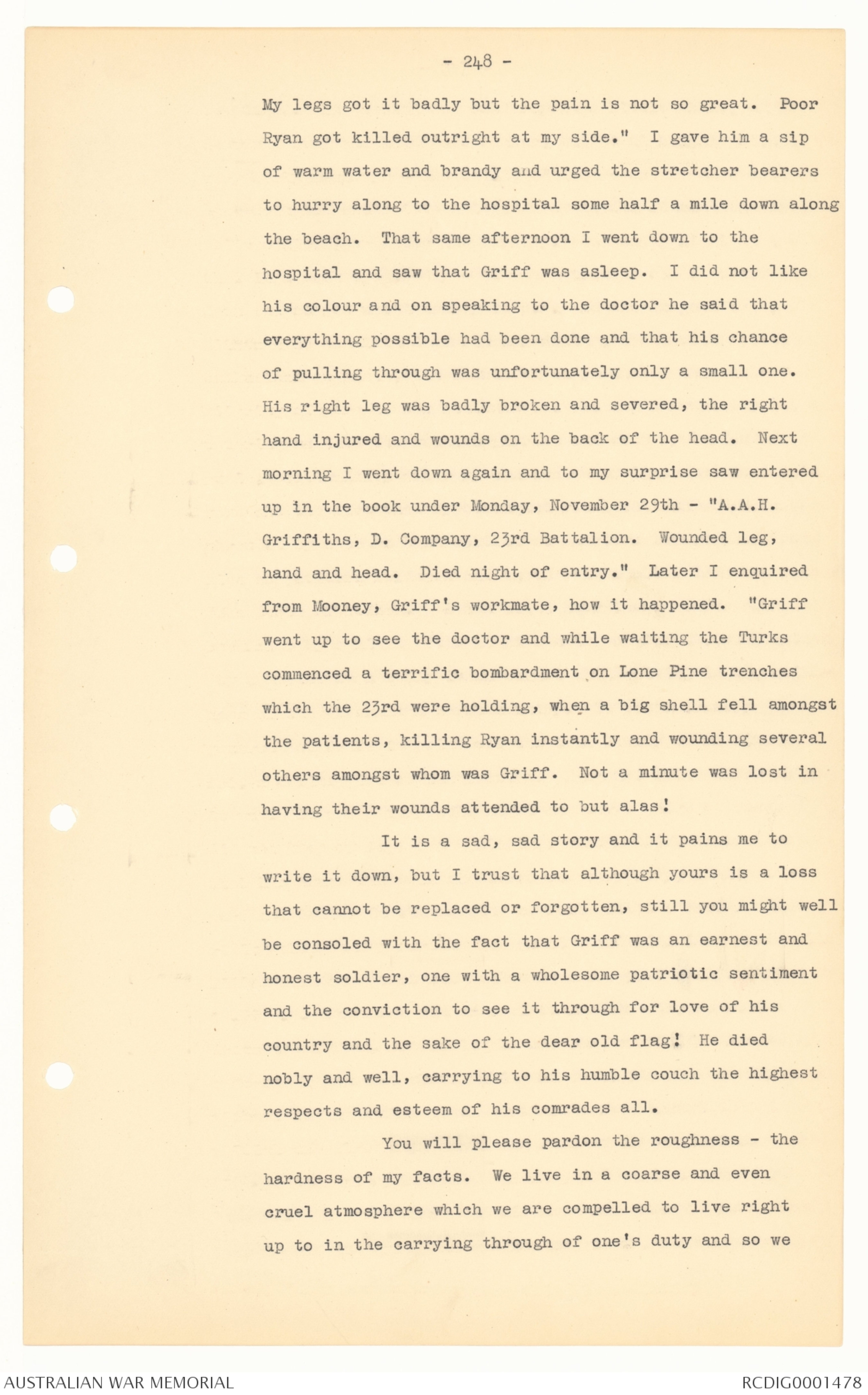
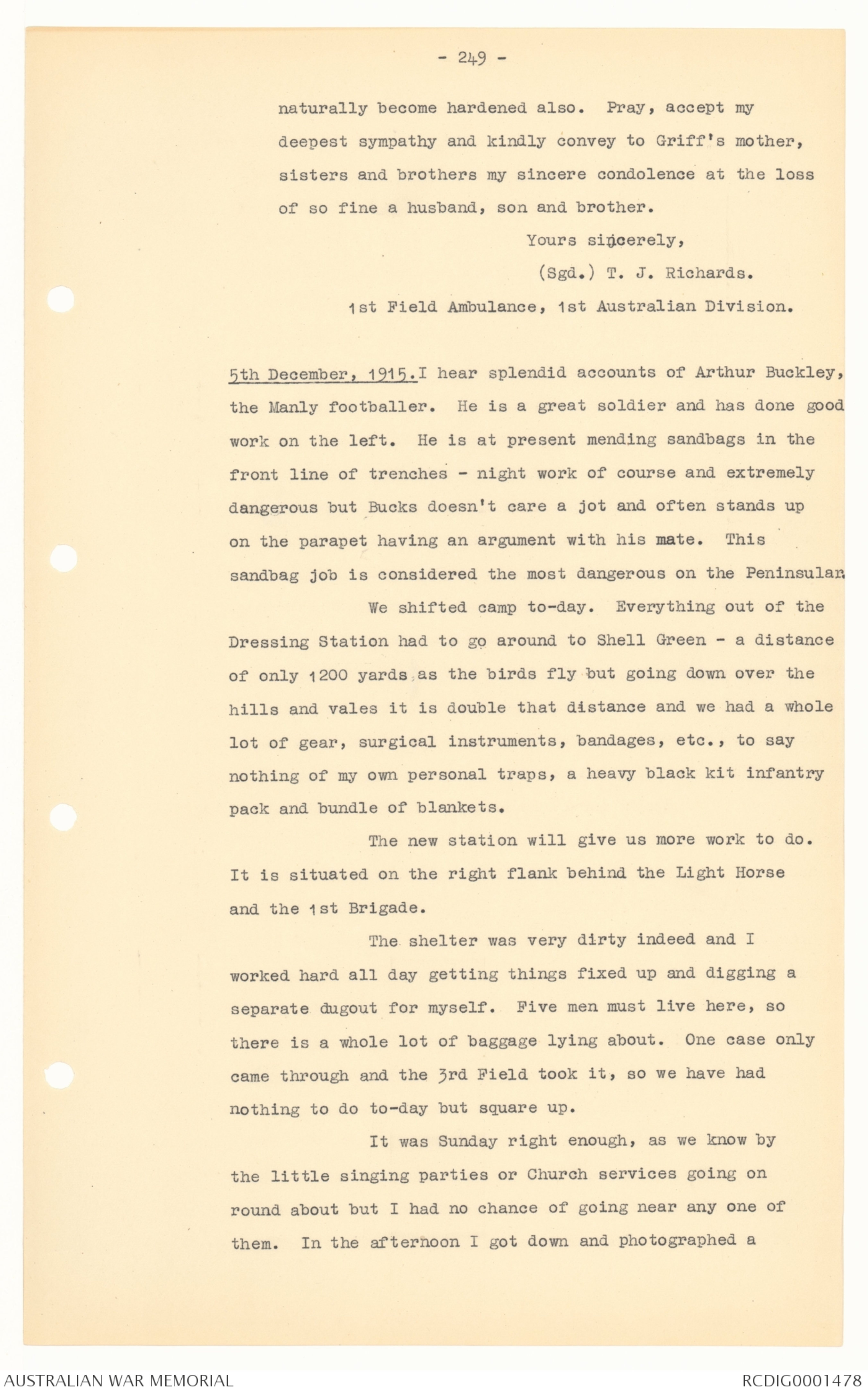
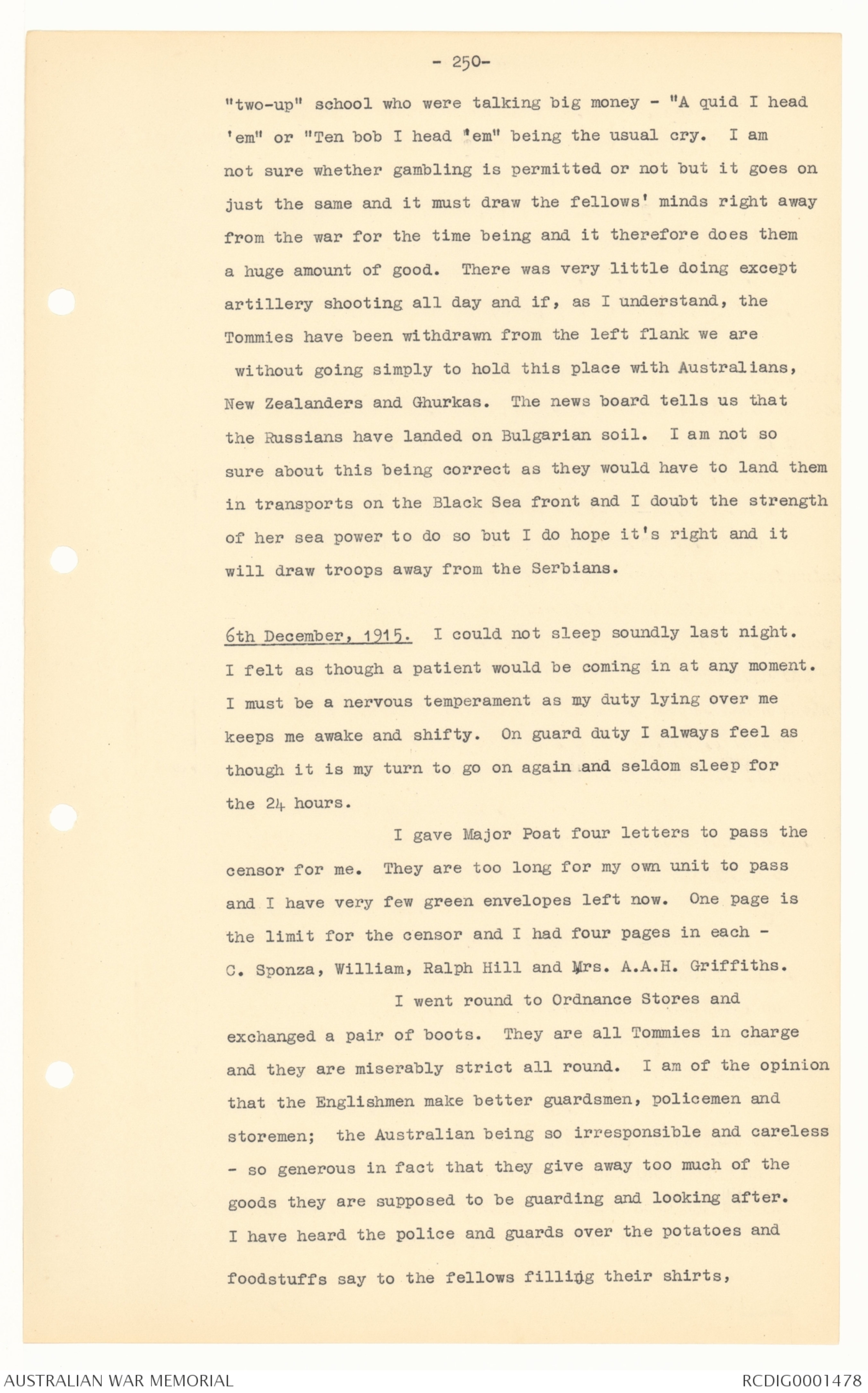
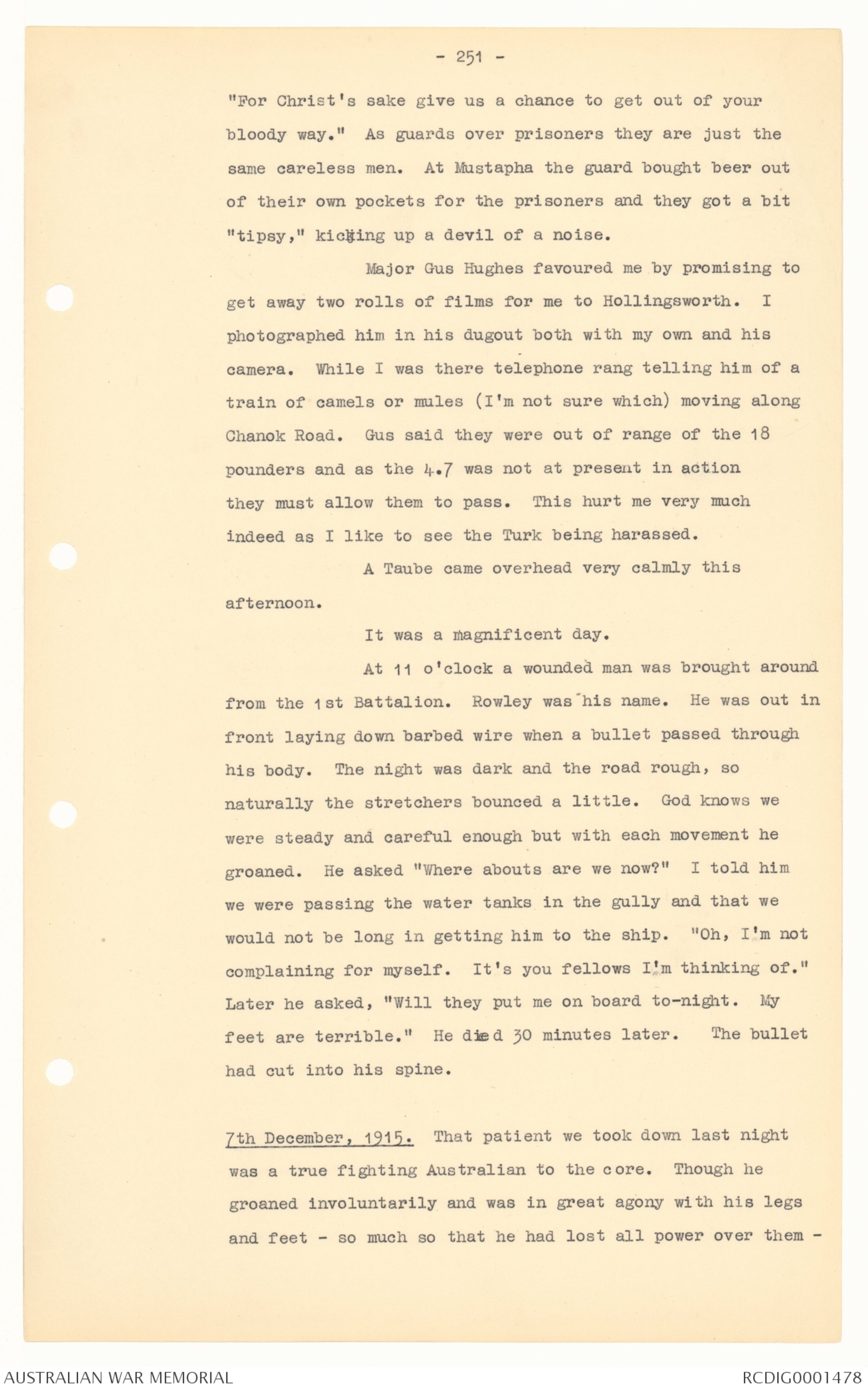
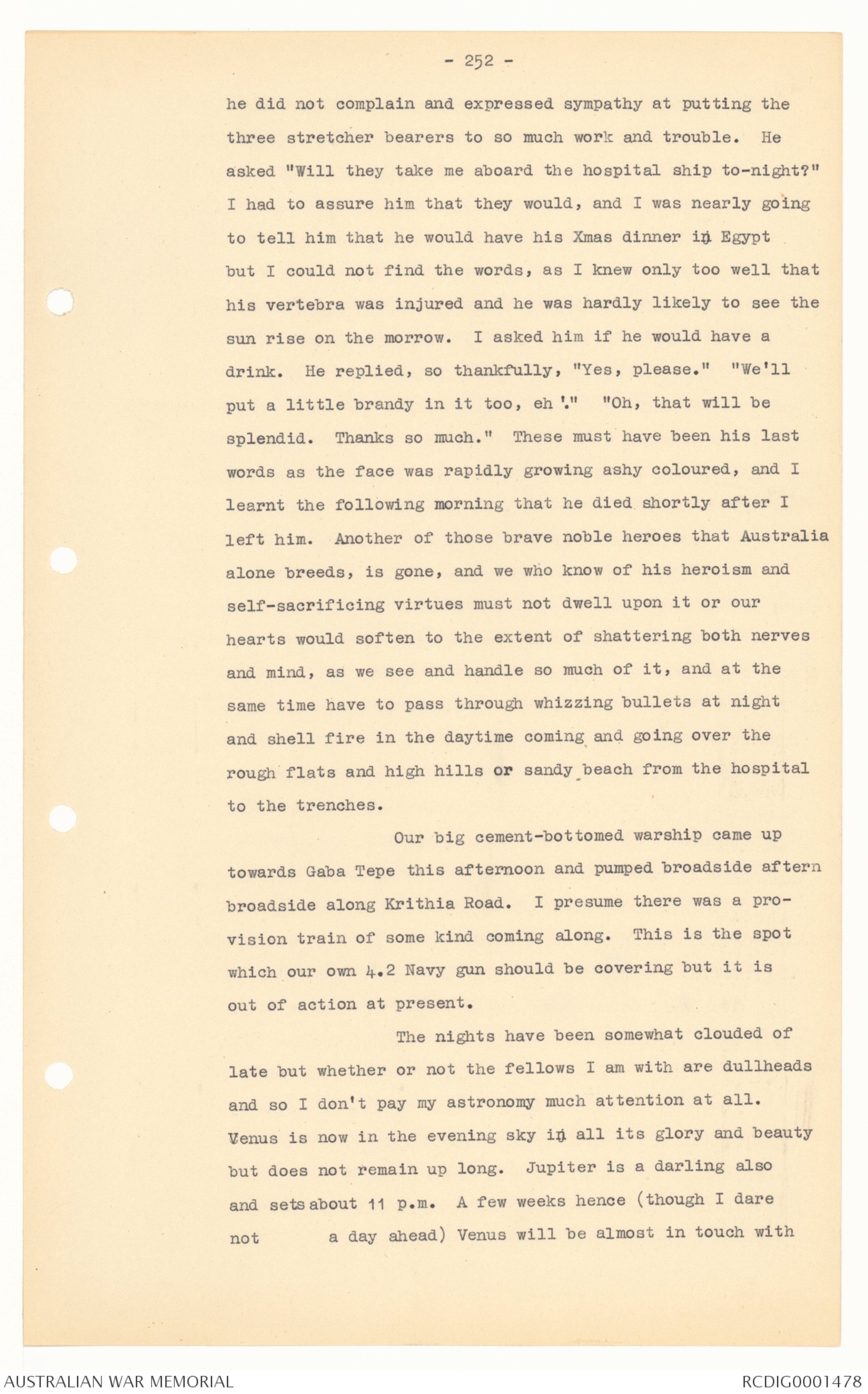
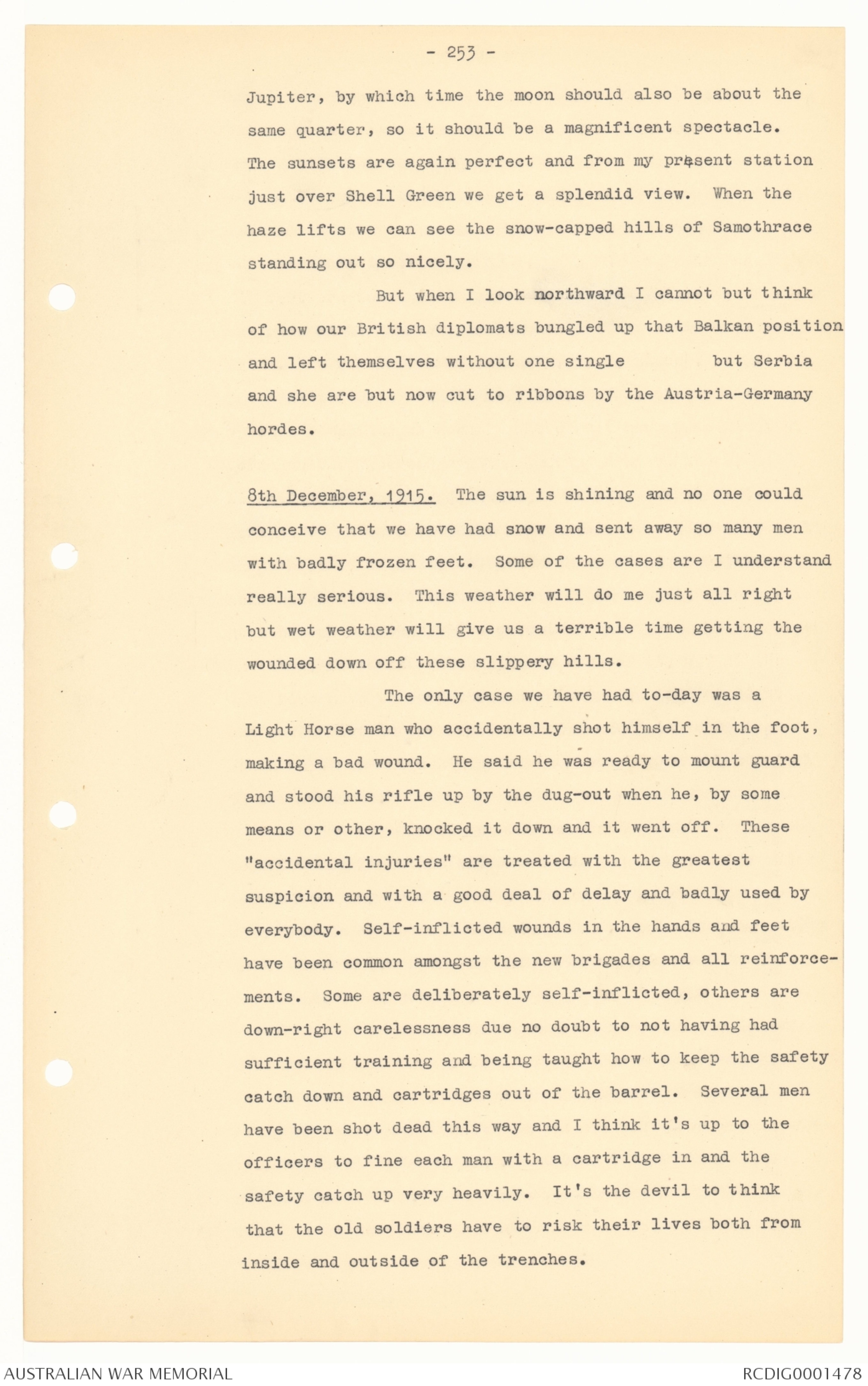
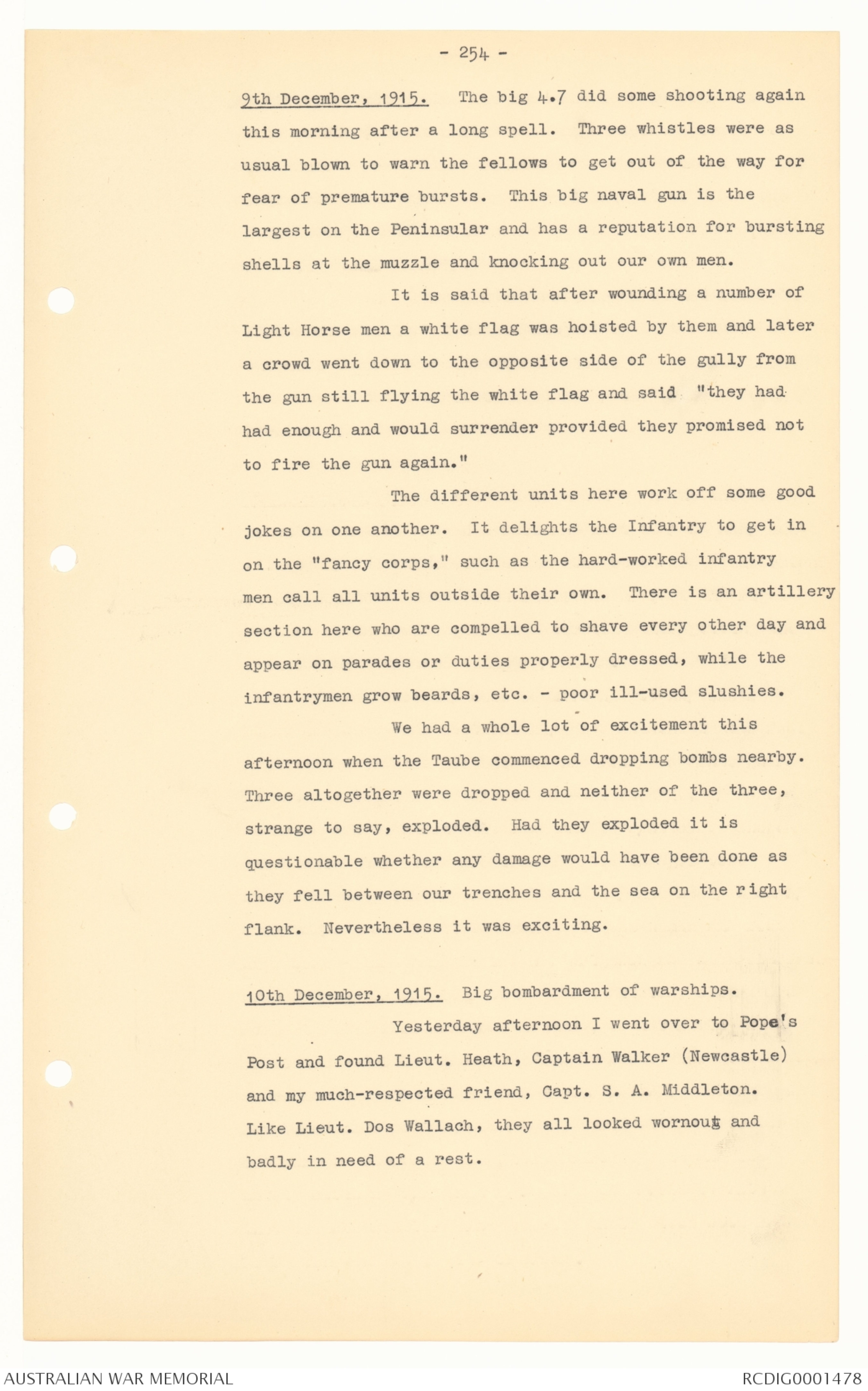
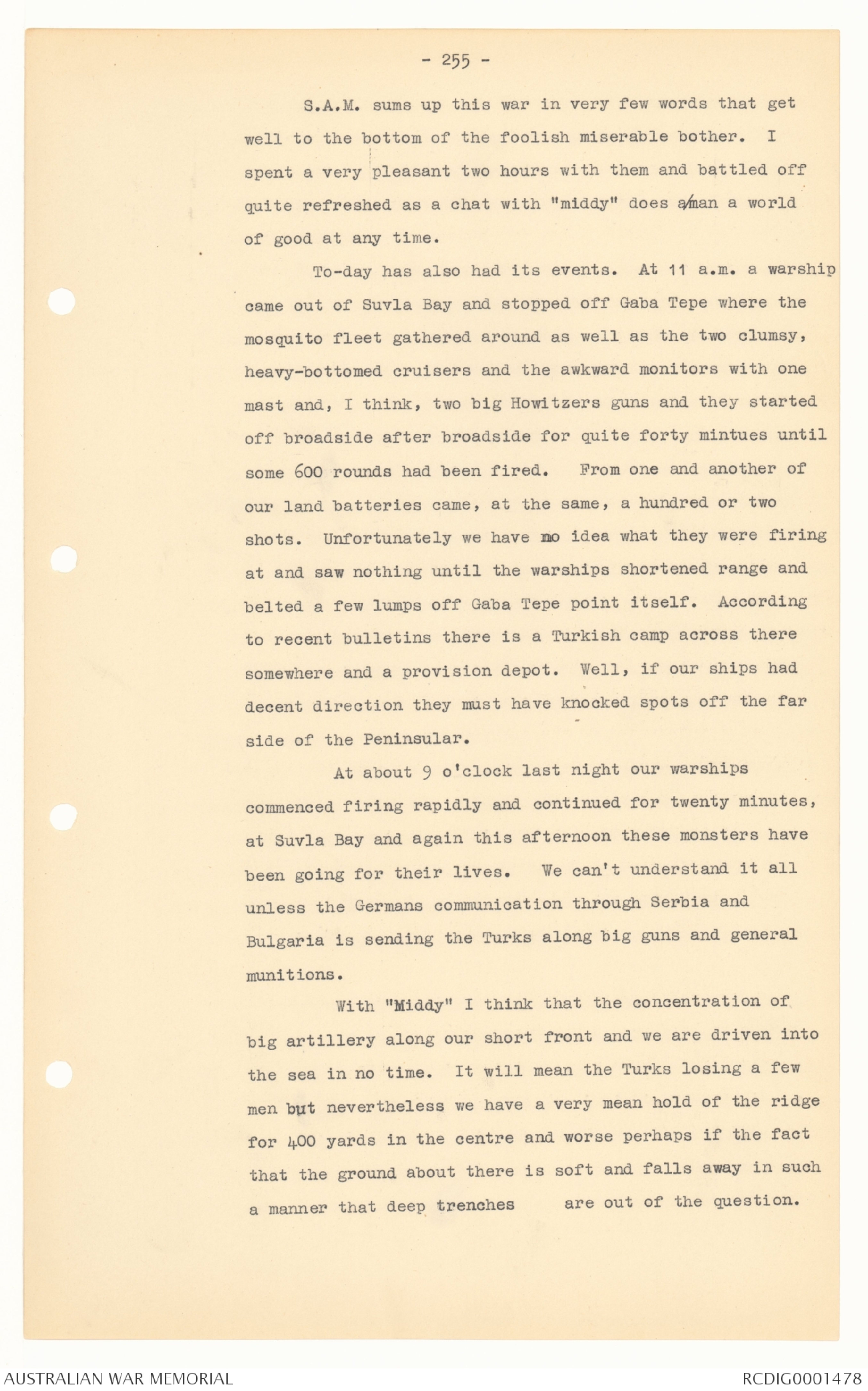
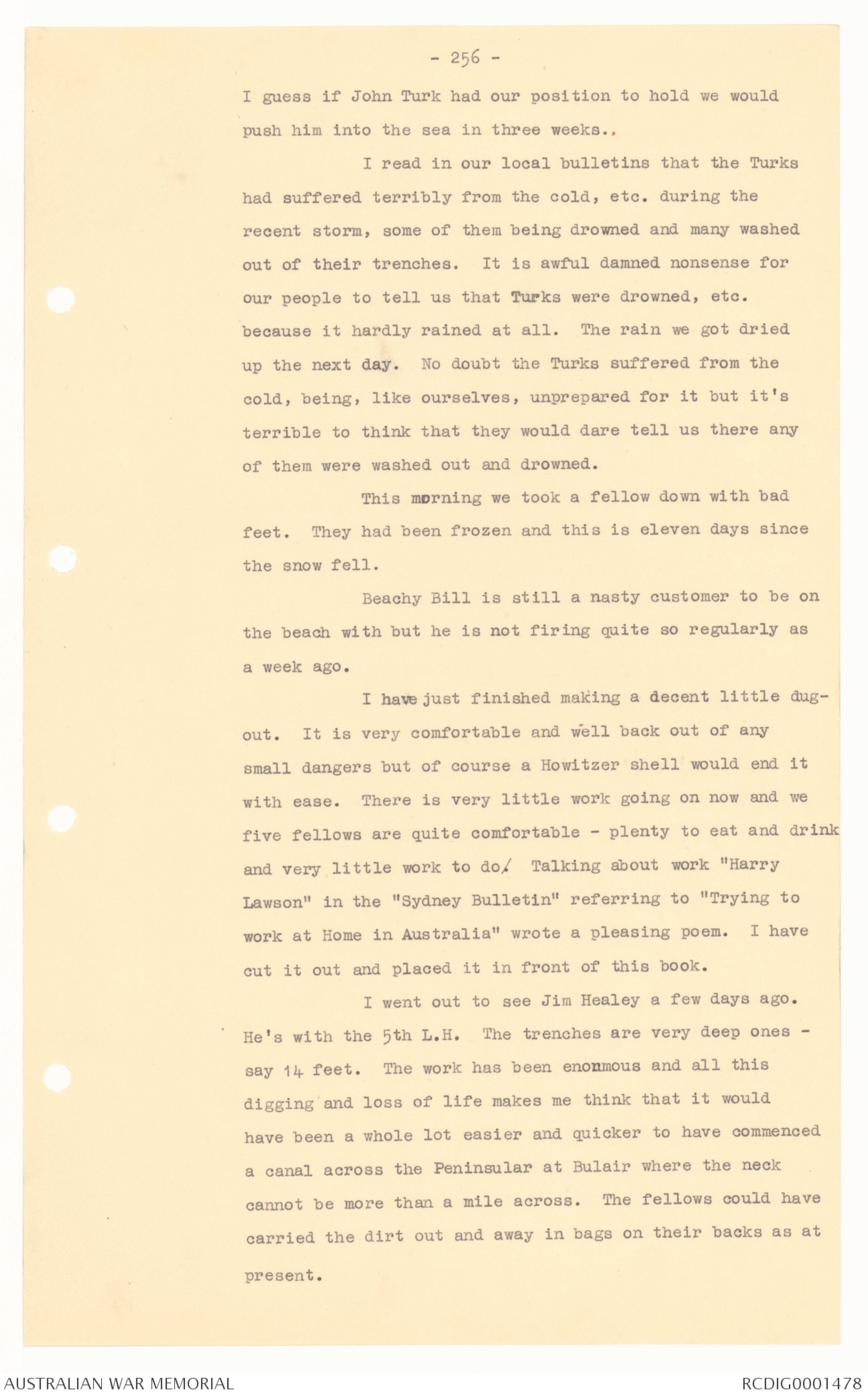
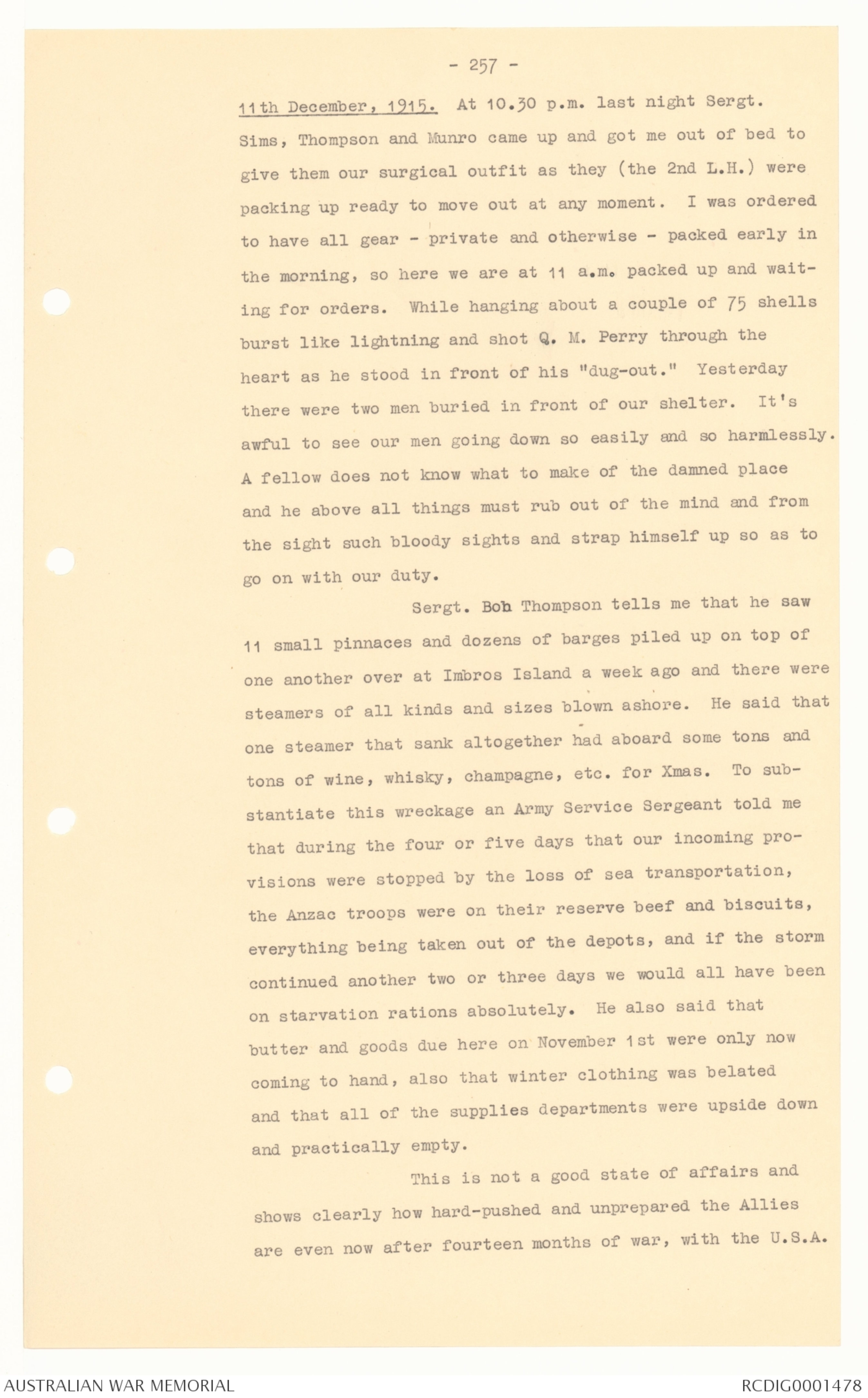
- 248 -
My legs got it badly but the pain is not so great. Poor
Ryan got killed outright at my side." I gave him a sip
of warm water and brandy and urged the stretcher bearers
to hurry along to the hospital some half a mile down along
the beach. That same afternoon I went down to the
hospital and saw that Griff was asleep. I did not like
his colour and on speaking to the doctor he said that
everything possible had been done and that his chance
of pulling through was unfortunately only a small one.
His right leg was badly broken and severed, the right
hand injured and wounds on the back of the head. Next
morning I went down again and to my surprise saw entered
up in the book under Monday, November 29th - "A.A.H.
Griffiths, D. Company, 23rd Battalion. Wounded leg,
hand and head. Died night of entry." Later I enquired
from Mooney, Griff's workmate, how it happened. "Griff
went up to see the doctor and while waiting the Turks
commenced a terrific bombardment on Lone Pine trenches
which the 23rd were holding, when a big shell fell amongst
the patients, killing Ryan instantly and wounding several
others amongst whom was Griff. Not a minute was lost in
having their wounds attended to but alas!
It is a sad, sad story and it pains me to
write it down, but I trust that although yours is a loss
that cannot be replaced or forgotten, still you might well
be consoled with the fact that Griff was an earnest and
honest soldier, one with a wholesome patriotic sentiment
and the conviction to see it through for love of his
country and the sake of the dear old flag! He died
nobly and well, carrying to his humble couch the highest
respects and esteem of his comrades all.
You will please pardon the roughness - the
hardness of my facts. We live in a coarse and even
cruel atmosphere which we are compelled to live right
up to in the carrying through of one's duty and so we
- 249 -
naturally become hardened also. Pray, accept my
deepest sympathy and kindly convey to Griff's mother,
sisters and brothers my sincere condolence at the loss
of so fine a husband, son and brother.
Yours sincerely,
(Sgd.) T. J. Richards.
1st Field Ambulance, 1st Australian Division.
5th December, 1915. I hear splendid accounts of Arthur Buckley,
the Manly footballer. He is a great soldier and has done good
work on the left. He is at present mending sandbags in the
front line of trenches - night work of course and extremely
dangerous but Bucks doesn't care a jot and often stands up
on the parapet having an argument with his mate. This
sandbag job is considered the most dangerous on the Peninsular
We shifted camp to-day. Everything out of the
Dressing Station had to go around to Shell Green - a distance
of only 1200 yards, as the birds fly but going down over the
hills and vales it is double that distance and we had a whole
lot of gear, surgical instruments, bandages, etc., to say
nothing of my own personal traps, a heavy black kit infantry
pack and bundle of blankets.
The new station will give us more work to do.
It is situated on the right flank behind the Light Horse
and the 1st Brigade.
The shelter was very dirty indeed and I
worked hard all day getting things fixed up and digging a
separate dugout for myself. Five men must live here, so
there is a whole lot of baggage lying about. One case only
came through and the 3rd Field took it, so we have had
nothing to do to-day but square up.
It was Sunday right enough, as we know by
the little singing parties or Church services going on
round about but I had no chance of going near any one of
them. In the afternoon I got down and photographed a
- 250 -
"two-up" school who were talking big money - "A quid I head
'em" or "Ten bob I head 'em" being the usual cry. I am
not sure whether gambling is permitted or not but it goes on
just the same and it must draw the fellows' minds right away
from the war for the time being and it therefore does them
a huge amount of good. There was very little doing except
artillery shooting all day and if, as I understand, the
Tommies have been withdrawn from the left flank we are
without going simply to hold this place with Australians,
New Zealanders and Ghurkas. The news board tells us that
the Russians have landed on Bulgarian soil. I am not so
sure about this being correct as they would have to land them
in transports on the Black Sea front and I doubt the strength
of her sea power to do so but I do hope it's right and it
will draw troops away from the Serbians.
6th December, 1915. I could not sleep soundly last night.
I felt as though a patient would be coming in at any moment.
I must be a nervous temperament as my duty lying over me
keeps me awake and shifty. On guard duty I always feel as
though it is my turn to go on again and seldom sleep for
the 24 hours.
I gave Major Poat four letters to pass the
censor for me. They are too long for my own unit to pass
and I have very few green envelopes left now. One page is
the limit for the censor and I had four pages in each -
C. Sponza, William, Ralph Hill and Mrs. A. A. H. Griffiths.
I went round to Ordnance Stores and
exchanged a pair of boots. They are all Tommies in charge
and they are miserably strict all round. I am of the opinion
that the Englishmen make better guardsmen, policemen and
storemen; the Australian being so irresponsible and careless
- so generous in fact that they give away too much of the
goods they are supposed to be guarding and looking after.
I have heard the police and guards over the potatoes and
foodstuffs say to the fellows filling their shirts,
- 251 -
"For Christ's sake give us a chance to get out of your
bloody way." As guards over prisoners they are just the
same careless men. At Mustapha the guard bought beer out
of their own pockets for the prisoners and they got a bit
"tipsy," kicjking up a devil of a noise.
Major Gus Hughes favoured me by promising to
get away two rolls of films for me to Hollingsworth. I
photographed him in his dugout both with my own and his
camera. While I was there telephone rang telling him of a
train of camels or mules (I'm not sure which) moving along
Chanok Road. Gus said they were out of range of the 18
pounders and as the 4.7 was not at present in action
they must allow them to pass. This hurt me very much
indeed as I like to see the Turk being harassed.
A Taube came overhead very calmly this
afternoon.
It was a magnificent day.
At 11 o'clock a wounded man was brought around
from the 1st Battalion. Rowley was his name. He was out in
front laying down barbed wire when a bullet passed through
his body. The night was dark and the road rough, so
naturally the stretchers bounced a little. God knows we
were steady and careful enough but with each movement he
groaned. He asked "Where abouts are we now?" I told him
we were passing the water tanks in the gully and that we
would not be long in getting him to the ship. "Oh, I'm not
complaining for myself. It's you fellows I'Im thinking of."
Later he asked, "Will they put me on board to-night. My
feet are terrible." He died 30 minutes later. The bullet
had cut into his spine.
7th December, 1915. That patient we took down last night
was a true fighting Australian to the core. Though he
groaned involuntarily and was in great agony with his legs
and feet - so much so that he had lost all power over them -
- 252 -
he did not complain and expressed sympathy at putting the
three stretcher bearers to so much work and trouble. He
asked "Will they take me aboard the hospital ship to-night?"
I had to assure him that they would, and I was nearly going
to tell him that he would have his Xmas dinner ijn Egypt
but I could not find the words, as I knew only too well that
his vertebra was injured and he was hardly likely to see the
sun rise on the morrow. I asked him if he would have a
drink. He replied, so thankfully, "Yes, please." "We'll
put a little brandy in it too, eh!" "Oh, that will be
splendid. Thanks so much." These must have been his last
words as the face was rapidly growing ashy coloured, and I
learnt the following morning that he died shortly after I
left him. Another of those brave noble heroes that Australia
alone breeds, is gone, and we who know of his heroism and
self-sacrificing virtues must not dwell upon it or our
hearts would soften to the extent of shattering both nerves
and mind, as we see and handle so much of it, and at the
same time have to pass through whizzing bullets at night
and shell fire in the daytime coming and going over the
rough flats and high hills or sandy beach from the hospital
to the trenches.
Our big cement-bottomed warship came up
towards Gaba Tepe this afternoon and pumped broadside aftern
broadside along Krithia Road. I presume there was a provision
train of some kind coming along. This is the spot
which our own 4.2 Navy gun should be covering but it is
out of action at present.
The nights have been somewhat clouded of
late but whether or not the fellows I am with are dullheads
and so I don't pay my astronomy much attention at all.
Venus is now in the evening sky in all its glory and beauty
but does not remain up long. Jupiter is a darling also
and setsabout 11 p.m. A few weeks hence (though I dare
not a day ahead) Venus will be almost in touch with
- 253 -
Jupiter, by which time the moon should also be about the
same quarter, so it should be a magnificent spectacle.
The sunsets are again perfect and from my pr4esent station
just over Shell Green we get a splendid view. When the
haze lifts we can see the snow-capped hills of Samothrace
standing out so nicely.
But when I look northward I cannot but think
of how our British diplomats bungled up that Balkan position
and left themselves without one single but Serbia
and she are but now cut to ribbons by the Austria-Germany
hordes.
8th December, 1915. The sun is shining and no one could
conceive that we have had snow and sent away so many men
with badly frozen feet. Some of the cases are I understand
really serious. This weather will do me just all right
but wet weather will give us a terrible time getting the
wounded down off these slippery hills.
The only case we have had to-day was a
Light Horse man who accidentally shot himself in the foot,
making a bad wound. He said he was ready to mount guard
and stood his rifle up by the dug-out when he, by some
means or other, knocked it down and it went off. These
"accidental injuries" are treated with the greatest
suspicion and with a good deal of delay and badly used by
everybody. Self-inflicted wounds in the hands and feet
have been common amongst the new brigades and all reinforcements.
Some are deliberately self-inflicted, others are
down-right carelessness due no doubt to not having had
sufficient training and being taught how to keep the safety
catch down and cartridges out of the barrel. Several men
have been shot dead this way and I think it's up to the
officers to fine each man with a cartridge in and the
safety catch up very heavily. It's the devil to think
that the old soldiers have to risk their lives both from
inside and outside of the trenches.
- 254 -
9th December, 1915. The big 4.7 did some shooting again
this morning after a long spell. Three whistles were as
usual blown to warn the fellows to get out of the way for
fear of premature bursts. This big naval gun is the
largest on the Peninsular and has a reputation for bursting
shells at the muzzle and knocking out our own men.
It is said that after wounding a number of
Light Horse men a white flag was hoisted by them and later
a crowd went down to the opposite side of the gully from
the gun still flying the white flag and said, "they had
had enough and would surrender provided they promised not
to fire the gun again."
The different units here work off some good
jokes on one another. It delights the Infantry to get in
on the "fancy corps," such as the hard-worked infantry
men call all units outside their own. There is an artillery
section here who are compelled to shave every other day and
appear on parades or duties properly dressed, while the
infantrymen grow beards, etc. - poor ill-used slushies.
We had a whole lot of excitement this
afternoon when the Taube commenced dropping bombs nearby.
Three altogether were dropped and neither of the three,
strange to say, exploded. Had they exploded it is
questionable whether any damage would have been done as
they fell between our trenches and the sea on the right
flank. Nevertheless it was exciting.
10th December, 1915. Big bombardment of warships.
Yesterday afternoon I went over to Pope's
Post and found Lieut. Heath, Captain Walker (Newcastle)
and my much-respected friend, Capt. S. A. Middleton.
Like Lieut. Dos Wallach, they all looked wornout and
badly in need of a rest.
- 255 -
S.A.M. sums up this war in very few words that get
well to the bottom of the foolish miserable bother. I
spent a very pleasant two hours with them and battled off
quite refreshed as a chat with "middy" does a/man a world
of good at any time.
To-day has also had its events. At 11 a.m. a warship
came out of Suvla Bay and stopped off Gaba Tepe where the
mosquito fleet gathered around as well as the two clumsy,
heavy-bottomed cruisers and the awkward monitors with one
mast and, I think, two big Howitzers guns and they started
off broadside after broadside for quite forty mintues until
some 600 rounds had been fired. From one and another of
our land batteries came, at the same, a hundred or two
shots. Unfortunately we have no idea what they were firing
at and saw nothing until the warships shortened range and
belted a few lumps off Gaba Tepe point itself. According
to recent bulletins there is a Turkish camp across there
somewhere and a provision depot. Well, if our ships had
decent direction they must have knocked spots off the far
side of the Peninsular.
At about 9 o'clock last night our warships
commenced firing rapidly and continued for twenty minutes,
at Suvla Bay and again this afternoon these monsters have
been going for their lives. We can't understand it all
unless the Germans communication through Serbia and
Bulgaria is sending the Turks along big guns and general
munitions.
With "Middy" I think that the concentration of
big artillery along our short front and we are driven into
the sea in no time. It will mean the Turks losing a few
men but nevertheless we have a very mean hold of the ridge
for 400 yards in the centre and worse perhaps if the fact
that the ground about there is soft and falls away in such
a manner that deep trenches are out of the question.
- 256 -
I guess if John Turk had our position to hold we would
push him into the sea in three weeks..
I read in our local bulletins that the Turks
had suffered terribly from the cold, etc. during the
recent storm, some of them being drowned and many washed
out of their trenches. It is awful damned nonsense for
our people to tell us that Turks were drowned, etc.
because it hardly rained at all. The rain we got dried
up the next day. No doubt the Turks suffered from the
cold, being, like ourselves, unprepared for it but it's
terrible to think that they would dare tell us there any
of them were washed out and drowned.
This morning we took a fellow down with bad
feet. They had been frozen and this is eleven days since
the snow fell.
Beachy Bill is still a nasty customer to be on
the beach with but he is not firing quite so regularly as
a week ago.
I have just finished making a decent little dugout.
It is very comfortable and well back out of any
small dangers but of course a Howitzer shell would end it
with ease. There is very little work going on now and we
five fellows are quite comfortable - plenty to eat and drink
and very little work to do/. Talking about work "Harry
Lawson" in the "Sydney Bulletin" referring to "Trying to
work at Home in Australia" wrote a pleasing poem. I have
cut it out and placed it in front of this book.
I went out to see Jim Healey a few days ago.
He's with the 5th L.H. The trenches are very deep ones -
say 14 feet. The work has been enormous and all this
digging and loss of life makes me think that it would
have been a whole lot easier and quicker to have commenced
a canal across the Peninsular at Bulair where the neck
cannot be more than a mile across. The fellows could have
carried the dirt out and away in bags on their backs as at
present.
- 257 -
11th December, 1915. At 10.30 p.m. last night Sergt.
Sims, Thompson and Munro came up and got me out of bed to
give them our surgical outfit as they (the 2nd L.H.) were
packing up ready to move out at any moment. I was ordered
to have all gear - private and otherwise - packed early in
the morning, so here we are at 11 a.m. packed up and waiting
for orders. While hanging about a couple of 75 shells
burst like lightning and shot Q. M. Perry through the
heart as he stood in front of his "dug-out." Yesterday
there were two men buried in front of our shelter. It's
awful to see our men going down so easily and so harmlessly.
A fellow does not know what to make of the damned place
and he above all things must rub out of the mind and from
the sight such bloody sights and strap himself up so as to
go on with our duty.
Sergt. Bohb Thompson tells me that he saw
11 small pinnaces and dozens of barges piled up on top of
one another over at Imbros Island a week ago and there were
steamers of all kinds and sizes blown ashore. He said that
one steamer that sank altogether had aboard some tons and
tons of wine, whisky, champagne, etc. for Xmas. To substantiate
this wreckage an Army Service Sergeant told me
that during the four or five days that our incoming provisions
were stopped by the loss of sea transportation,
the Anzac troops were on their reserve beef and biscuits,
everything being taken out of the depots, and if the storm
continued another two or three days we would all have been
on starvation rations absolutely. He also said that
butter and goods due here on November 1st were only now
coming to hand, also that winter clothing was belated
and that all of the supplies departments were upside down
and practically empty.
This is not a good state of affairs and
shows clearly how hard-pushed and unprepared the Allies
are even now after fourteen months of war, with the U.S.A.
 Beverley Pagano
Beverley PaganoThis transcription item is now locked to you for editing. To release the lock either Save your changes or Cancel.
This lock will be automatically released after 60 minutes of inactivity.